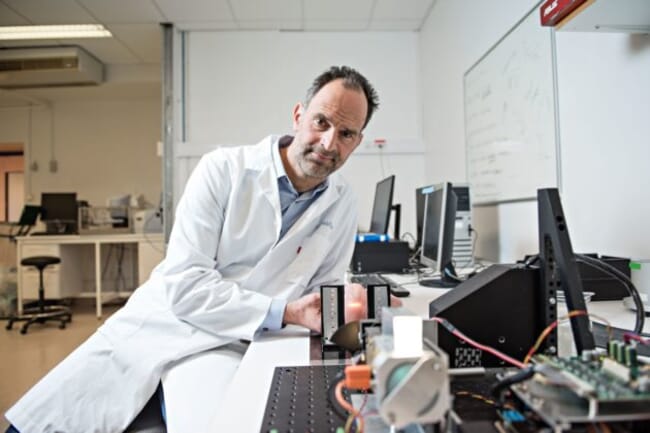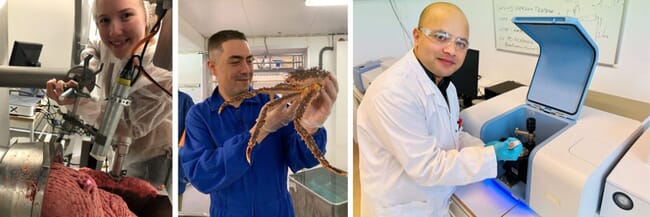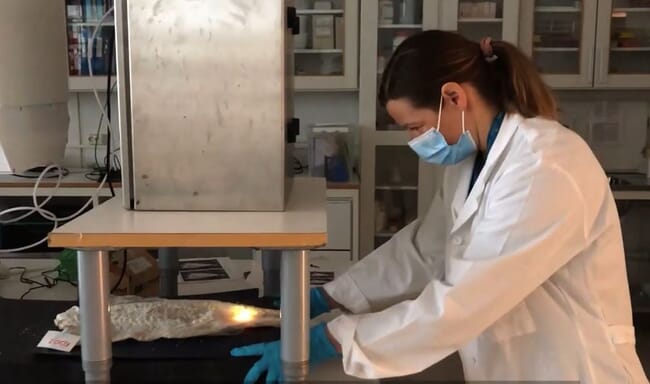
Senior scientist Jens Petter Wold at Nofima leads DigiFoods. He has more than 20 years’ experience with developing smart sensors to the food industry © Jon-Are Berg-Jacobsen, Nofima
Monitoring the quality of raw materials allows you to optimise both their utilisation and the processes. This will help make the food industry, including manufacturing, more efficient and sustainable.
A technology optimist with a great respect for nature
“DigiFoods’ research takes place in the intersections between food technology, processing control, sensor development, robotics and data analytics. This provides good opportunities for innovation on many levels,” says the head of the centre, Jens Petter Wold.
He is a technology optimist with a great respect for nature and has worked on developing rapid spectroscopic measuring methods for the food industry for more than twenty years. Jens Petter Wold has seen first-hand how the potential for precise, detailed measurements using non-destructive sensors has grown in line with digital advances. For example, ten years ago, you could measure the fat content of raw materials. Today, you can analyse their fatty acid composition.
One of the main things that drives the senior scientist is a desire to ensure that raw materials are used to their fullest and that as little as possible is wasted.
“A lot of energy goes into producing and distributing food. We need to make sure that everything is eaten. Fighting food waste is very important,” he points out.
He adds that while technology can do a lot, the work must always be based on an understanding of nature.
“Technology can make us more sustainable, and our goal should not merely be to become more efficient. We are efficient enough. The technology we are developing in DigiFoods will allow us to use these resources sustainability.
Useful spectroscopic applications
In 2021, DigiFoods’ researchers developed a number of applications based on spectroscopy (light spectrum measurements) that can be useful in the food industry.
Doctoral student Tiril Aurora Lindtvedt and her research colleagues have established that both Raman spectroscopy (a method for measuring various properties at a molecular level) and near-infrared (NIR) hyperspectral imaging technology are suitable for measuring food quality at high speeds. For example, this could involve measuring the omega-3 fatty acids EPA and DHA in whole salmon fillets, directly on the processing line. Aquaculture is showing a great deal of interest in this application.

Three of the young scientists in DigiFoods who develop useful applications, f.l. Ph.D student Tiril Aurora Lindtvedt, Post Doc Samuel Ortega Sarmiento and Ph.D student Bijay Kafle © Nofima
Postdoctoral researcher Samuel Ortega Sarmiento has, together with his colleagues, demonstrated that hyperspectral imaging can also be used to separate poor quality halibut, so-called “mushy halibut”, from normal Greenland halibut. Mushy fish with a jelly-like consistency is a challenge for the industry that processes this species of fish. Being able to identify mushy halibut before processing would be a big advantage. This could be an important application for the seafood industry.
PhD student Bijay Kafle and his colleagues are developing new applications based on Fourier transform infrared spectroscopy (FTIR). One of the applications they are in the process of developing is designed to be able to measure the quality of protein powder produced from residual raw materials. The goal is to make a relatively cheap and portable FTIR instrument that can be used directly on the processing line in manufacturing, both to monitor the hydrolysis process and to document product quality
An NIR instrument calibrated to monitor dry matter in raw potato strips has been installed on an industrial processing line. The researchers are about to start investigating whether the measurements made can be used to control and improve the process.

The NIR instrument can be used to measure water content in dried and salted cod © DigiFoods
Collecting large volumes of data
The experts in DigiFoods are already hard at work collecting, processing and analysing data from a number of food industry companies. The long-term goal is to develop data-driven solutions for processing, product and value chain optimisation.
In the years ahead, it will be important for DigiFoods to collect data on a large scale from both smart sensors and other processes in the food value chain.




